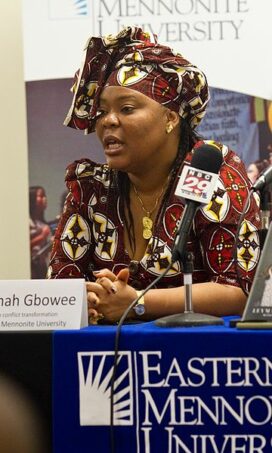Facts about Leymah Gbowee
Leymah Gbowee Biography
Leymah Gbowee won the Nobel Peace Prize in 2011 for her part in ending Liberia’s civil wars, and for her efforts to promote peace, democracy and women’s rights in Africa. She grew up in Monrovia, Liberia’s capital, and was a witness to the horrors of war as a teenager and young mother. She was a social worker in Liberia in the late 1990s, but fled to Ghana and in 2001 earned a degree from Mother Patern College of Health and Sciences. While in Ghana, Leymah Gbowee got involved with peace activists, and by 2002 she was a leading member of the Women in Peacebuilding Program (WIPNET) and the West African Network for Peacebuilding (WANEP). A Christian who reached out to the Muslim community, Gbowee helped organize widespread non-violent prayer protests that in 2003 helped bring an end to Liberia’s 14 years of civil war. She gained fame for leading a “sex strike” — urging Liberian women to refuse relations until the war stopped — and even forced a meeting with then-president Charles Taylor. The reforms that followed brought about the election of Liberia’s President Ellen Johnson Sirleaf in 2005, and earned international awards for Leymah Gbowee. Over the next few years, Gbowee spoke at the U.N. (2006), earned a graduate degree in Conflict Transformation (2007, from Virginia’s Eastern Mennonite University), hobnobbed with American philanthropists, and starred in the documentary Pray the Devil Back to Hell (2008). Gbowee is the director of Women Peace and Security Network Africa (based in Ghana) and the author of the 2011 memoir Mighty Be Our Powers: How Sisterhood, Prayer and Sex Changed a Nation at War. She shared her 2011 Nobel Prize with President Sirleaf and Yemen’s Tawakkol Karman.
Extra credit
Leymah Gbowee has six children… Pray the Devil Back to Hell was produced by Abigail Disney, the grandniece of Walt Disney… About her name, Leymah Gbowee wrote in her memoir, “My mother had wanted a boy. Leymah means ‘what is it about me?’ — as in ‘Why can’t I conceive a male?’”… The Liberian “sex strike” was reminiscent of Lysistrata, the ancient comedy by Aristophanes, in which Greek women withhold sex as a way to get their men to end The Peloponnesian War.

